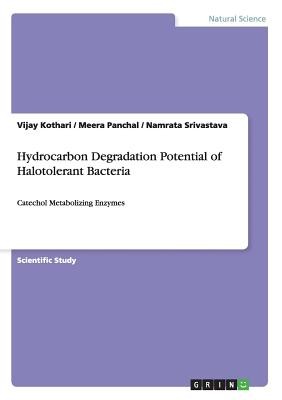
- We will send in 10–14 business days.
- Author: Vijay Kothari
- Publisher: GRIN Verlag
- Year: 2014
- Pages: 64
- ISBN-10: 3656600120
- ISBN-13: 9783656600121
- Format: 14.8 x 21 x 0.4 cm, softcover
- Language: English
- SAVE -10% with code: EXTRA
Hydrocarbon Degradation Potential of Halotolerant Bacteria (e-book) (used book) | bookbook.eu
Reviews
Description
Scientific Study from the year 2013 in the subject Biology - Micro- and Molecular Biology, grade: A, Nirma University (Institute of Science), language: English, abstract: Hydrocarbon contamination of marine ecosystems has been a major environmental concern. Hydrocarbon metabolizing capacity of four halotolerant bacteria (Bacillus atrophaeus, Halomonas shengliensis, Halomonas koreensis, and Virgibacillus salarius) isolated from saline soil of Khambhat, India was investigated. Presence of catechol metabolizing enzymes (catechol 2,3 dioxygenase, chlorocatechol 1,2 dioxygenase, and protocatechuate 3,4 dioxygenase) was checked in V. salarius, as only this among all the test organisms could grow on the hydrocarbon substrates used, and compared with Pseudomonas oleovorans. Effect of salinity of the growth medium on activity of catechol metabolizing enzymes was also studied. Catechol 2,3 dioxygenase activity in both the organisms was more susceptible to increase in salinity of the growth medium than chlorocatechol 1,2-dioxygenase activity. To the best of our awareness, this is the first report of catechol metabolism in V. salarius. V. salarius was found to be capable of weak biofilm formation. As V. salarius is capable of growing at high salt concentration, alkaline pH, hydrocarbon degradation, and also of growth in presence of various metal ions, it can be an attractive candidate for bioremediation of marine oil spills. Organisms like V. salarius can also serve as a model for multiple stress tolerance in prokaryotes.
EXTRA 10 % discount with code: EXTRA
The promotion ends in 20d.17:48:15
The discount code is valid when purchasing from 10 €. Discounts do not stack.
- Author: Vijay Kothari
- Publisher: GRIN Verlag
- Year: 2014
- Pages: 64
- ISBN-10: 3656600120
- ISBN-13: 9783656600121
- Format: 14.8 x 21 x 0.4 cm, softcover
- Language: English English
Scientific Study from the year 2013 in the subject Biology - Micro- and Molecular Biology, grade: A, Nirma University (Institute of Science), language: English, abstract: Hydrocarbon contamination of marine ecosystems has been a major environmental concern. Hydrocarbon metabolizing capacity of four halotolerant bacteria (Bacillus atrophaeus, Halomonas shengliensis, Halomonas koreensis, and Virgibacillus salarius) isolated from saline soil of Khambhat, India was investigated. Presence of catechol metabolizing enzymes (catechol 2,3 dioxygenase, chlorocatechol 1,2 dioxygenase, and protocatechuate 3,4 dioxygenase) was checked in V. salarius, as only this among all the test organisms could grow on the hydrocarbon substrates used, and compared with Pseudomonas oleovorans. Effect of salinity of the growth medium on activity of catechol metabolizing enzymes was also studied. Catechol 2,3 dioxygenase activity in both the organisms was more susceptible to increase in salinity of the growth medium than chlorocatechol 1,2-dioxygenase activity. To the best of our awareness, this is the first report of catechol metabolism in V. salarius. V. salarius was found to be capable of weak biofilm formation. As V. salarius is capable of growing at high salt concentration, alkaline pH, hydrocarbon degradation, and also of growth in presence of various metal ions, it can be an attractive candidate for bioremediation of marine oil spills. Organisms like V. salarius can also serve as a model for multiple stress tolerance in prokaryotes.


Reviews